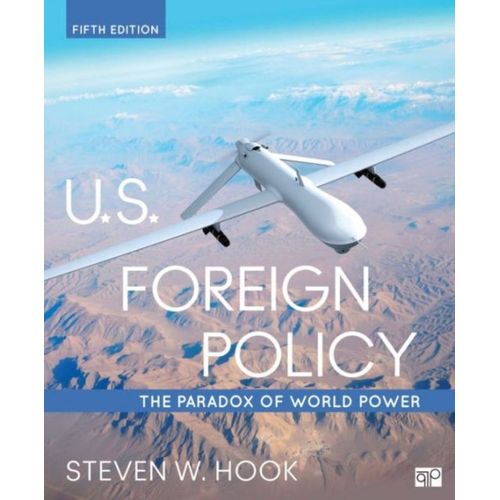

U.S. Foreign Policy - Steven W. Hook
- Format: Broché
- 520 pages Voir le descriptif
Vous en avez un à vendre ?
Vendez-le-vôtre31,99 €
Occasion · Très Bon État
Ou 8,00 € /mois
- Payez directement sur Rakuten (CB, PayPal, 4xCB...)
- Récupérez le produit directement chez le vendeur
- Rakuten vous rembourse en cas de problème
Gratuit et sans engagement
Félicitations !
Nous sommes heureux de vous compter parmi nos membres du Club Rakuten !
TROUVER UN MAGASIN
Retour

Avis sur U.S. Foreign Policy de Steven W. Hook Format Broché - Livre
0 avis sur U.S. Foreign Policy de Steven W. Hook Format Broché - Livre
Donnez votre avis et cumulez 5
Les avis publiés font l'objet d'un contrôle automatisé de Rakuten.
Présentation U.S. Foreign Policy de Steven W. Hook Format Broché
- LivreAuteur(s) : Steven W. HookEditeur : Sage Publications IncLangue : AnglaisParution : 01/02/2016Format : Moyen, de 350g à 1kgNombre de pages : 520Expédition : 796Dimensions : 19.3 x 23.3 x...

Résumé :
Biographie:
Steven W. Hook is professor and former chair of political science at Kent State University. He has authored and edited numerous books, including U.S. Foreign Policy Today: American Renewal? (2012, with James M. Scott), Routledge Handbook of American Foreign Policy (2012, with Christopher Jones), Democratic Peace in Theory and Practice (2010), Comparative Foreign Policy (2002), and National Interest and Foreign Aid (1995). His journal articles have appeared in leading journals, including World Politics, International Studies Quarterly, Foreign Policy Analysis. Professor Hook is a past president of the Foreign Policy Analysis sections of the American Political Science Association and the International Studies Association.
Sommaire:
PART I. The Setting of U.S. Foreign Policy
Chapter 1: The United States in a Turbulent World
Snapshot: America's World Power
Challenges to U.S. Primacy
The Paradox of America's World Power
Conclusion
Chapter 2: The Expansion of U.S. Power
Economic and Territorial Expansion
Fighting Two World Wars
Global Primacy and the Cold War
New Challenges after the Cold War
Conclusion
Chapter 3: Dynamics of Decision Making
The Global Context: Rival Perspectives
Opening the Black Box of Domestic Politics
The Impact of Civil Society
Coping with Bureaucratic Politics
The Human Factor
Conclusion
PART II. Inside-Out: Government Sources of Foreign Policy
Chapter 4: Presidential Power
The Constitution's Mixed Blessing
Presidential Prerogative in the Zone of Twilight
Structures of the Presidential Branch
Judicial Interventions in Foreign Policy
Conclusion
Chapter 5: Congress beyond the Water's Edge
Trends in Legislative-Executive Relations
Constraints on Congressional Action
Legislating Foreign Policy
War Powers and the Use of Force
The Power of the Purse
Conclusion
Chapter 6: The Foreign Policy Bureaucracy
Agency Dysfunctions and the Paradox of World Power
The Diplomatic Complex
The Security Complex
The Intelligence Complex
The Economic Complex
Conclusion
PART III. Outside-In: External Sources of Foreign Policy
Chapter 7: Public Opinion at Home and Abroad
Democracy and the Paradox of World Power
Public Opinion since World War II
Group Identities and Foreign Policy Views
Conclusion
Chapter 8: The Impact of Mass Communications
Functions of the News Media
Patterns of Foreign News Coverage
Government Efforts to Control the Message
The Social Media Revolution
Online News and Views from Overseas
Conclusion
Chapter 9: Social Movements and Interest Groups
Group Action and the Paradox
Dynamics of Social Movements
Types of Foreign Policy NGOs
Group Strategies and Tactics
Buying Power: The Corporate Connection
Conclusion
PART IV. Policy Domains
Chapter 10: National Security and Defense Policy
The Foundation of Strategy
Justifying the Use of Force
The Nuclear Shadow
Waging War on Terror
Conclusion
Chapter 11: Economic Statecraft
Models of Political Economy
The Balance of Economic Power
Trade Policy as a Two-Level Game
National Interests and Foreign Aid
Economic Sanctions as a Policy Tool
Conclusion
Chapter 12: Transnational Policy Problems
Managing the Global Commons
The Immigration Debate
The Dangers of Weapons Proliferation
Promoting Human Rights and Democracy
Signs of a More Peaceful World
Conclusion
Détails de conformité du produit
Personne responsable dans l'UE
